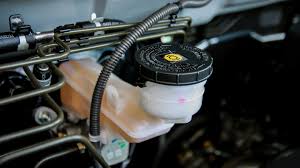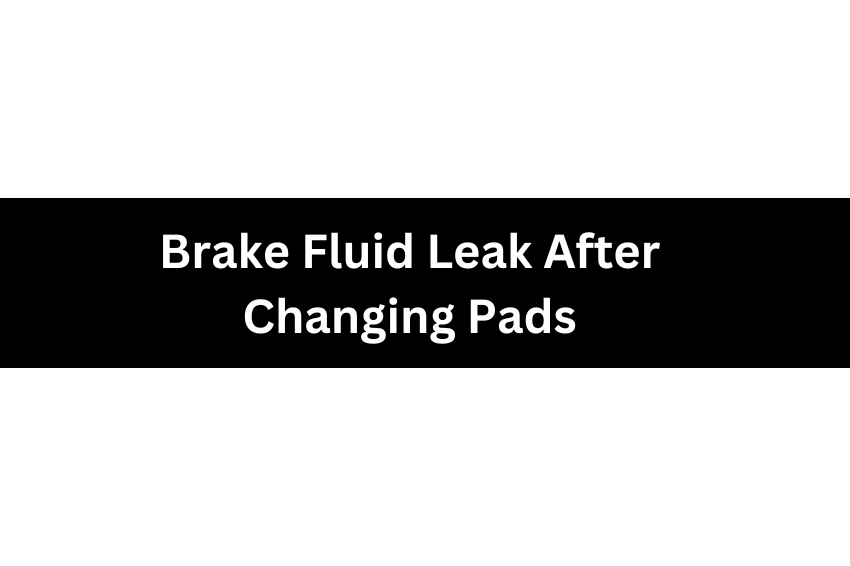If you’ve noticed a brake fluid leak after changing your brake pads, then you need to fix it right away to ensure your safety.
This guide will walk through why a brake fluid leaks after changing your brake pads, how you can fix it step-by-step, and when to seek professional help
Why Is Brake Fluid Leaking After Changing Brake Pads?
There are several reasons why a brake fluid leaks after changing your brake pads.
Often, a brake fluid leak occurs due to small issues in the brake system that may have been affected during the brake pad replacement process.
One common cause is a loose bleeder screw.
This screw, which allows air to escape from the brake lines during bleeding, might not have been tightened after changing the pads.
When this happens, brake fluid can slowly leak out, reducing the effectiveness of your brakes over time.
It’s a good idea to check the bleeder screw first, as tightening it might solve the issue quickly.
Another reason for a brake fluid leak could be a damaged or twisted brake line.
When changing brake pads, the brake line can sometimes get bumped or twisted, especially if it’s an older line.
Even a small crack or twist in the brake line can cause a leak and impact the hydraulic pressure, which is essential for the brakes to work properly.
Inspecting the brake line for visible signs of wear or damage can help you figure out if this is the problem.
The brake caliper seals may also be the cause.
When brake pads are changed, the calipers could shift slightly, and if the seals are already worn or misaligned, they can start leaking fluid.
These seals are important for keeping the brake fluid contained, so if they’re damaged, fluid can escape.
Misaligned or worn seals will need to be realigned or replaced to stop the leak.
Sometimes, the issue is with the brake fluid reservoir.
If you or the mechanic added extra brake fluid when the pads were changed, it could create too much pressure in the brake system.
This extra pressure can force fluid out through weak areas or connections, causing a leak.
Checking the brake fluid level and making sure it’s not overfilled can help reduce this pressure and prevent leaks.
With that said, if you’re uncertain about what’s causing the brake fluid leak or if it continues after you check these areas, it’s best to consult a professional.
Is It Safe To Drive With A Brake Fluid Leak After Changing Pads?
Driving with a brake fluid leak after changing brake pads is not safe and should be avoided.
When brake fluid leaks, the hydraulic pressure in your brake system can drop, which directly affects your ability to stop the vehicle.
Without enough pressure, the brake pedal may feel soft, or you might have to press it harder to get any braking response.
This loss of brake pressure makes it much harder to control your stopping distance, which increases the risk of accidents, especially in situations where you need to stop suddenly.
So, If you’re wondering, “Can I drive with a brake fluid leak after changing brake pads?” the answer is no, as driving with a brake fluid leak can lead to brake failure.
Even if the leak seems small, it can still impact braking performance over time.
A minor leak can quickly worsen, causing the brake fluid level in the reservoir to drop lower and potentially activate the brake warning light.

This light is an important signal that the braking system needs immediate attention and should not be ignored.
In this situation, it’s best to avoid driving and check the brake fluid reservoir to see if the level is low.
If it is, you should add fluid only as a temporary fix and seek professional help as soon as possible.
An experienced mechanic can check the entire brake system, including the master cylinder, brake lines, and brake calipers, to find and repair the source of the leak.
While it may be tempting to keep driving with a minor leak, keep in mind that a properly working brake system is essential for your safety.
Ignoring a brake fluid leak not only puts you at risk but also endangers other drivers on the road.
How To Fix Brake Fluid Leak After Changing Brake Pads?
Here’s a step-by-step guide to help you fix a brake fluid leak yourself, but remember, if you feel unsure at any point, it’s always a good idea to consult a professional mechanic.
Step 1: Identify The Source Of The Leak
Start by finding where the brake fluid leak is coming from.
Look for wet spots around the brake caliper, brake lines, and bleeder screws.
If you notice any visible fluid, that’s where the leak is.
The brake fluid reservoir can also be checked to see if the fluid level is lower than usual, which may indicate a leak in one of these areas.
Step 2: Tighten Or Replace Parts
If you’ve found the leak around the bleeder screw or brake line, you might be able to tighten the screw or the connections to stop the leak.
Use a wrench to carefully tighten any loose screws or fittings.
If the leak is from a worn or damaged part, such as a caliper seal or a cracked brake line, you’ll need to replace the damaged component.
Step 3: Refill The Brake Fluid
Once you’ve addressed the leak, refill the brake fluid.
Open the brake fluid reservoir and add the appropriate fluid for your vehicle.

Be sure to use the correct type of brake fluid (check your vehicle’s manual) and fill it up to the recommended level.
Low fluid levels can lead to loss of brake pressure, so ensure it’s topped up.
Step 4: Test The Brakes
Before driving, press the brake pedal several times to make sure the brakes feel firm and responsive.
If the pedal still feels soft or you notice any issues with braking performance, it could mean the leak hasn’t been fully fixed, or there’s still air in the brake lines.
You might need to bleed the brakes to remove air bubbles from the system.
If you can’t find the source of the leak or if tightening the components doesn’t fix the issue, it’s best to seek professional help.
A mechanic can replace damaged brake lines or seals and ensure that your brake system is fully functional.
Related Post:
Does Brake Fluid Leak When The Car Is Off?
5 Brake Fluid Leak Symptoms
Brake Fluid Leaking From Front Driver Side
Leaking Brake Fluid Cost To Repair (2024 Guide)
